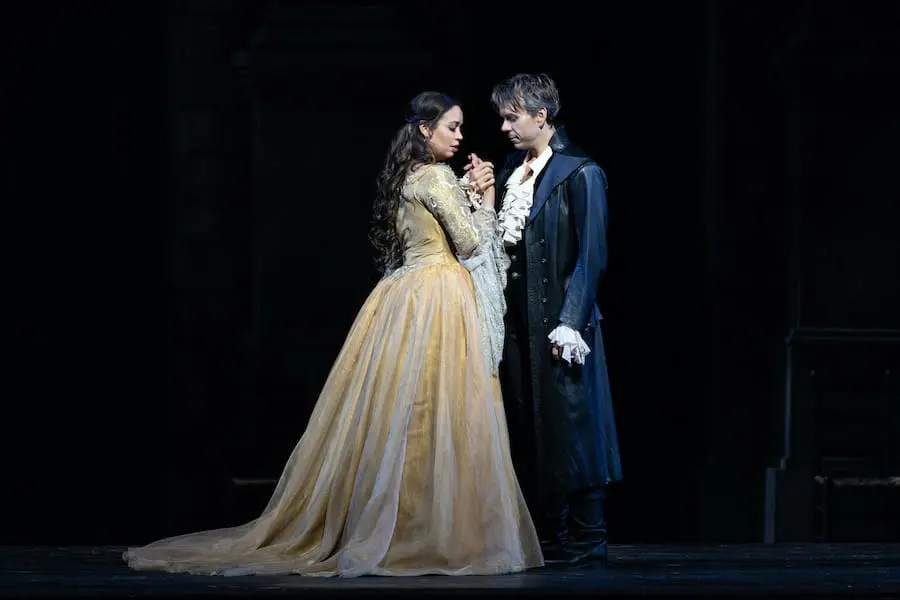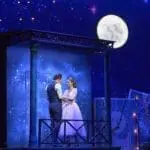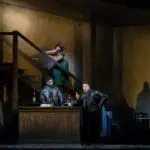The New York Times critic W. J. Henderson, back in 1897, punningly dubbed The Metropolitan Opera the “Faustspielhaus,” so dominant was Charles Gounod’s chef d’oeuvre in the company’s repertory. But another opera of Gounod’s, Roméo et Juliette, didn’t lag far behind; and after a two-decade absence in the mid-twentieth century, it seems to be back in full swing in the twenty-first, amassing more performances in the new millennium than the once-unbeatable Faust.
Faust was the third opera Yannick Nézet-Séguin conducted at The Met, in November 2011, his Music Directorship still a few years ahead of him. Now he’s gotten round to Roméo ([*two shows left: March 27 and 30]), and my fond memories of his way with Gounod were bolstered by his work with this less extrovert, more fragile score: propulsive but never hectic, and more attentive to his singers’ capacities than he often is in Italian opera. He worked with the evening’s Juliette, Nadine Sierra, to fashion an airily swinging “Je veux vivre” that seemed a real collaboration, not one musician arbitrarily leading the other; and for its Roméo, Benjamin Bernheim—a tenor with a notable penchant for soft singing—he underpinned the honeyed voice with a matching instrumental caress. Not unexpectedly, the orchestra—like Donald Palumbo’s chorus—delivered its high-class best.
This was The Met’s second revival of its 2016–17 Bartlett Sher production (first seen in Salzburg and Milan), with its Verona-town-square unit set by Michael Yeargan that—after the tiresome turntable excesses of this season’s new Carmen and La forza del destino and of Sher’s own Rigoletto of two seasons back—has the highly laudable virtue of just staying put. The bulk of the action unfolds on the stage floor: Roméo doesn’t climb up to Juliette’s balcony, she descends to him; and their wedding night is spent in the same open space where, a few minutes earlier, Tybalt killed Mercutio and Roméo killed Tybalt. But Sher’s action—now supervised by Gina Lapinski—is clear and cogent, and never saddles the singers with awkward business. Theatrically, this is a good, tight, straightforward show.
The cast was a strong lot, from the bottom up—all of them but one (Jeongcheol Cha, in the minor role of Grégorio) newcomers to their characters at The Met. Twenty-six years earlier almost to the day. bass-baritone Alfred Walker made his Met debut in that same small role; for this run (I saw its fourth outing, on March 19) he’s graduated to the plot-driving Frère Laurent, and a fine, grave, sonorous one he was, too. Another fine bass-baritone, Canada’s Nathan Berg, sang a characterful, sturdy (excepting a couple of top notes) Capulet; tenor Frederick Ballentine played a suitably menacing Tybalt; mezzo-soprano Eve Gigliotti, as Gertrude (aka the Nurse) was, as ever, a winning presence; and as the brash young Montague page Stéphano, her fellow mezzo Samantha Hankey once again sang as handsomely as she wears a pair of trousers. Baritone Will Liverman, so stolid in his big contemporary roles, was a pleasant surprise as a nimble, neatly sung Mercutio, though I couldn’t help missing his two Canadian predecessors in this production, Elliot Madore and Joshua Hopkins, with their extra doses of dash, swagger, and style.
Sierra, though, offered the best-sung Juliette this production has seen; looking perfectly lovely, she commanded all the notes with ease. But she wasn’t ideal: she has yet to acquire the knack, at least while singing in French, of letting the words colour the voice and shape and shade the music, and she often allowed showy emoting to get in the way of simple, honest emotion. These flaws were highlighted by her pairing with Bernheim, who inflected the language with all the love his boyish, easily enacted Roméo so clearly felt for his Juliette. Vocally, this was an imperfect match, with her bright soprano and more forthright delivery frequently obscuring his softer, sweeter tenor and gentler manner in their duets. His solos, too, were delectably nuanced; but the top notes rang out excitingly when he chose to show them off, as he did with a clarion B-flat to cap his splendidly fashioned “Ah, lève-toi, soleil.” Bernheim’s Roméo, more than anything else, was what made this Roméo special; and when he gazed at Sierra’s Juliette with an infectiously smitten smile, he made the audience fall for her, too.
Related Content ↘
Opera Canada depends on the generous contributions of its supporters to bring readers outstanding, in-depth coverage of opera in Canada and beyond. Please consider subscribing or donating today.















